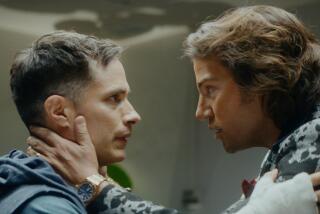Boxing Mentor Who Offers Life Lessons
- Share via
When Fidel Briseno first saw the 12-year-old boy in his North Hollywood backyard, he told his father plainly that the youngster would have to work hard to be a boxer.
“Or, you’ll just have to take him back,” Briseno said of Miguel Espino Jr. The words rang in the boy’s ears.
“He said, ‘If I put an effort into it, he will train me,’ ” Miguel remembered. Now, Miguel, who will turn 16 on Friday, can look back on winning the National Silver Gloves championship last year in Kansas, and this year finishing second in the same tournament two weeks ago.
A decade ago, Briseno, 28, had fought only five professional bouts before an accident on a construction job left him with a detached retina. After retiring from boxing, Briseno looked around at the gang violence in his North Hollywood neighborhood and knew he had something better to offer.
“I was a little bit of a troubled kid myself,” said Briseno, who now lives in Pacoima. As a 13-year-old new immigrant from Mexico, Briseno started boxing at an old jail converted to a gym on Pico Boulevard. He said the sport kept him from getting in trouble.
A decade and a half later in his backyard, Briseno started training local boys to box. He was helping them trade the potential violence ahead of them for a thinking sport, he said.
“I wouldn’t call it violent,” Briseno said of boxing. “It’s an art. If you see Sugar Ray Leonard, you don’t think of him as violent. He shows you his moves.”
His program has struggled. He was able to move it into a building after joining the Los Angeles Police Department’s Jeopardy program.
Every weeknight, Briseno and 10 youngsters, ages 6 to 18, meet at the Pacoima Recreation Center for a workout that can last as long as 2 1/2 hours. The boys have to be at least 8 to box, but the younger ones can still work out. And they all have to keep up in school and stay out of trouble.
“I tell them not to use the skills of boxing for personal aggression,” Briseno said. “Not to use it out on the street. If I heard of anyone fighting in the street I would probably throw them out.”
Briseno, a manager at a Pacoima art studio, says boxing teaches the boys about broader issues.
“As a fighter you just have to be positive,” he said. “You’ve got to think about everything you do. You have to keep your feet on the ground and have composure at all times.”
As for Miguel, the teenager has improved a lot in the past four years, Briseno said. He sees other champions in his group, but Briseno says with conviction that Miguel will be in the 2000 Olympics.
“Before, he used to be just a brawler,” Briseno said. “Now he’s using his skills. He can slug you and he can box you. He’s learning to be disciplined.”
Miguel has learned from Briseno to be gracious to his opponents, win or lose. “It’s all a learning experience,” said Miguel, who has his eye on competing in the International Junior Olympics later this year.
“He’s shown me through the years he wants to be a champion,” Briseno said.
To Miguel, Briseno has become more than a coach, but a friend to turn to when he needs to talk out a problem.
“He’s like my second dad,” Miguel said.
Personal Best is a weekly profile of an ordinary person who does extraordinary things. Please send suggestions on prospective candidates to Personal Best, Los Angeles Times, 20000 Prairie St., Chatsworth 91311. Or fax it to (818) 772-3338.
More to Read
Go beyond the scoreboard
Get the latest on L.A.'s teams in the daily Sports Report newsletter.
You may occasionally receive promotional content from the Los Angeles Times.










